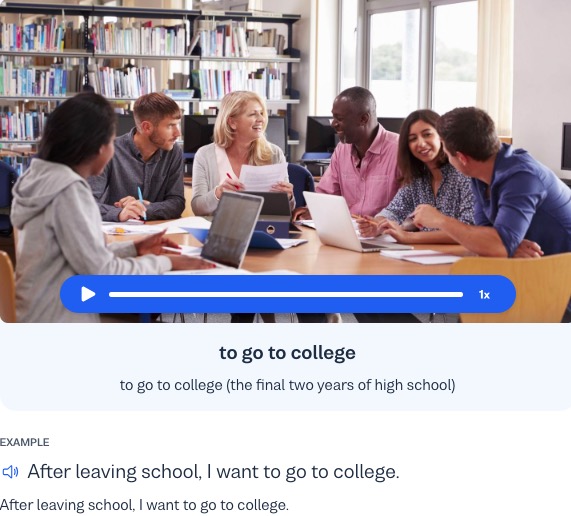Foreign Language Requirements for Colleges
Your guide to foreign language requirements for college admissions.
I want to learn...
Learning a second language can be challenging, but it’s worth it – whether you’re hoping to study abroad or trying to figure out which college you want to attend.
If you’re wondering what the foreign language requirements are for colleges today, you’re in the right place. In this guide, you’ll learn:
- Why you should be taking a language right now
- What the language requirements are for some major US colleges and universities
- Which top schools don’t require a foreign language
- Which language you should learn
- What to do if you’re worried about meeting a foreign language requirement
That’s a lot to cover, so let’s dive right in.
Why do you need to learn a foreign language for college admissions?
To start, let’s take a look at some reasons you should probably be taking a language right now, if you aren’t already studying a foreign language.
1. Many colleges have language requirements
If you were wondering, “Do colleges require foreign language skills?” The answer is, in short, yes! Many top universities around the world do expect you to have learned at least a little bit of a second language.
This is a traditional requirement for colleges because foreign languages can help in many different areas of study, from reading untranslated versions of books in comparative literature to understanding historical texts to reading from scientific source materials. Knowing what you want to study can help inform which language you might want to learn.
That said, for your purposes as a potential college applicant, the most important thing you need to know is that your dream school may well have a language requirement, ranging from a semester or two to several years of study, depending on the school. There’s a list further down in the article of some sample requirements, but if you know where you might want to go, you’d be wise to look up school-specific requirements.
2. It can help you keep your options open
Learning a language has purposes beyond meeting requirements! If you’re undecided on your major or are considering something that crosses international boundaries – like global studies or business – knowing a second language can help keep pathways open for you.
3. It can boost your resume
Just because a school doesn’t have a foreign language requirement doesn’t mean they don’t care whether or not you’ve learned one! A second language can look impressive on a resume, for both prospective schools and potential employers.
What are the language requirements for top schools?
The answer to the question, “How many foreign language credits are required for college?” is a little complicated. Each school has its own unique admission requirements and processes. In this section, we’ll look at the requirements for some of the nation’s most popular and renowned schools to get a representative sampling of what you can expect when it comes to foreign language requirements.
Harvard Foreign Language Requirement
As one of the top and most coveted schools in the county, many students wonder, how many years of foreign language does Harvard require? Harvard does not impose a strict language requirement, but does recommend students hoping to go to Harvard take four years of a single foreign language to more fully prepare themselves for a liberal arts education.
That said, Harvard takes a holistic approach in assessing students. They require that those who have not already studied a foreign language instead study a foreign language while at Harvard. They also allow those who have gained proficiency in a language outside of a traditional classroom setting to test out of the language requirement in a variety of ways, so they would certainly take into account those that speak a second language at home or have otherwise learned outside school.
MIT Foreign Language Requirement
Like Harvard, MIT doesn’t enforce a strict foreign language requirement that could keep you from getting in. However, they do strongly suggest high school students hoping to attend MIT include two years of a foreign language in their studies.
NYU Foreign Language Requirement
NYU is a little more strict about their foreign language requirement. They require applicants to have taken three to four years of a foreign language. They do, however, make an exception for those that did not have the option to do so. That means, if you haven’t taken three or more years of foreign language classes but still hope to apply to NYU, you may want to prepare an explanation for why you haven’t been able to take those classes.
UCLA Foreign Language Requirement
The UCLA foreign language requirement is at least two years of language other than English, with at least three years recommended. They make a note that they look for applicants who go above and beyond any minimum requirements listed and take the most rigorous academic path available to them.
USC Foreign Language Requirement
Like Harvard and MIT, the USC foreign language requirement is more of a recommendation. They recommend you take two to four years of a foreign language in high school, but will consider your application as a whole.
Overall, all of the schools reviewed made some variation on the same comment. Essentially, this is their recommendation to best prepare you for their school, but if for some reason you haven’t met them – because foreign language classes weren’t available to you or you prioritized other academic and extracurricular activities that better suited you and your studies – your application will still be considered.
If you’ve taken fewer classes than your preferred school requires or recommends, demonstrating an interest in your chosen foreign language – either through proven progress outside of school or an assessment of your existing language skills – may help your chances. This is especially true if you’re proficient in another language or want to demonstrate dedication to academic rigor.
Level up your foreign language skills with Busuu
Whether you’re trying to get into college, currently studying, or well past school years, you can still get tons of great benefits from learning a language.
When you learn with Busuu, you get bite-sized lessons designed by experts and support from a community of learners, including feedback from native speakers of whichever language you choose.
What’s the right language to learn for college admissions?
To be honest, this comes down to you! Most college foreign language requirements don’t specify which language you need to speak, unless you happen to be applying to major in a specific language.
That said, there are a few things you could use to guide you.
1. Your field of study.
If there’s a language that will be more useful in your chosen field of study, you should probably learn that! This would be especially true for those going into fields that have long histories with source materials in other languages. If you’re working on Western medieval literature, French or German might help you tackle untranslated texts. If you plan to study international relations, you may want to focus on one of the world’s most spoken languages.
2. Your experience with languages so far.
If you speak a second language with your family, taking formal language classes in that will help you reach proficiency faster. If you have plenty of time and want to demonstrate your willingness to take on a challenge, you could learn one of the hardest languages for English speakers, like Arabic or Chinese. Or, if you’re short on time but want to make an effort, you could choose one of the easiest languages for English speakers to learn, like Spanish.
3. The languages offered at your school.
This is actually multiple points in one. Of course, it’ll be easiest to choose to learn something you can take as a class in high school! That said, if you have a choice between languages at your current school (or can’t take languages at school so you opt to learn a language online), you should look at the classes you’ll be able to take at your university of choice to help you make your pick. And, if you’re hoping to study abroad, taking into account the study abroad options at your prospective colleges can help you get started on the right foot.
4. Your career plans.
This goes beyond your field of study and on to what you want to do with your life. If you’re studying sports medicine with the hopes of one day working with soccer players, you might want to learn the language of one of the countries where the sport is most popular. If you’re studying culinary arts with the intention of someday learning to make sushi, you might want to work on your Japanese. And so on! Check out our article that features jobs you can take on if you know how to speak multiple languages.
What should you do if you’re worried about meeting the requirements for your dream school?
It’s understandable to worry about how many years of foreign language colleges require, but if you’re worried you’re a little behind or your transcript won’t shine, there’s plenty you can do to stand out.
First, make sure you know exactly what your dream school is looking for and what they say about not meeting any recommendations or requirements. Second, focus on what you have been doing and what makes you so great. And third, you can always boost your language skills with language learning outside of school – say, for example, using Busuu!
And that’s everything you need to know about college foreign language requirements
Remember, learning doesn’t stop with high school. Your journey is only just beginning!
You don’t need to be fluent in a foreign language to learn one now – in fact, some colleges require instead that you take a foreign language during your university-level studies.
But, even if you have no such requirement, it can be handy to leave school with a foreign language under your belt, for the same reasons it can be handy to learn a language when you’re looking to get into college!
After all, speaking a second language isn’t just a theoretical pursuit, it can have positive effects on your career and overall quality of life. So what are you waiting for?
Get ahead of the pack and learn a language today!
Set yourself up for success by learning a foreign language! Choose from 14 languages offered by Busuu and get access to free online courses and lessons, plus big support from fellow language students in the Busuu community!
You might also like...
The 8 best languages to learn for international business
5 top tips on how to learn Japanese
Benefits of learning a foreign language for students
The 6 best ways to learn a language while traveling
Benefits and importance of bilingual education
How polyglots learn languages
The benefits and importance of multilingualism

